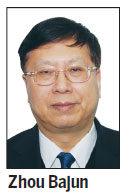Financiers' open letter sends wrong message
Updated: 2014-04-30 07:20
By Zhou Bajun(HK Edition)
|
|||||||
On April 23, about 70 people from Hong Kong's financial sector, including hedge fund managers and former Hong Kong Stock Exchange executives, published an open letter to President Xi Jinping. In the letter, they demanded what they called "genuine universal suffrage". The letter was not only published as advertisements in local Chinese and English newspapers, it was also translated into Japanese and French for overseas distribution. Some signatories are known advocates of the illegal "Occupy Central" campaign.
This is an unusual episode in Hong Kong's history. The city has a tradition of trade and commerce. Although the community has been politicized since the early 1990s, when then governor Christ Patten introduced some political reforms. But the business community generally displayed political apathy until the fourth Chief Executive (CE) election in 2012. In the 2012 CE election interest groups from the business world openly supported different CE candidates. But they and their supporters were all described as part of the "Love the Nation and Love Hong Kong" camp. Until then, the opposition camp received no visible support from the business circles. What we are seeing now is that for the first time the business community is revealing divisions - particularly in the financial sector.
Some signatories of the open letter might think they are sincere about protecting values vital to Hong Kong's success as an international financial center. But the demands expressed in the letter and their support for the "Occupy Central" movement in the name of "real universal suffrage" will severely damage the four great cornerstones of Hong Kong. These four cornerstones have made the city a leading international financial center.

First, the rule of law, which now risks being greatly compromised. The "Occupy Central" advocates have been promoting their illegal campaign as "Occupy Central with Peace and Love". But these actions have been against existing laws from the very beginning. They defy the rule of law and threaten public order. The movement's advocates have repeatedly provoked the central government by describing the "Occupy" campaign as a "nuclear bomb". They say it is set to explode and destroy Hong Kong if Beijing refuses to meet the opposition's demands for "real universal suffrage".
Second, the prosperity and stability of Hong Kong will be severely damaged. If the "Occupy" campaign eventually explodes in Central, it will paralyze Hong Kong as an international financial center and result in economic cardiac arrest. If the campaign proceeds, the city's economic system will, to some extent, stop working. Even if the economy manages to recover later, Hong Kong will find itself perpetually struggling with politically induced tremors. Meanwhile, divisions between rich and poor, between the young and older people in government, between tycoons and small businessmen and so on will be harder to resolve.
Third, the relationship between Hong Kong and the mainland will be poisoned. The open letter not only requested "real universal suffrage" but also demanded that Western political models should be copied. This blatantly breaches the founding principles of Hong Kong's relationship with the mainland. Recently, the economic and personal relations between Hong Kong and the mainland have already been seriously damaged. If the HKSAR is turned into an independent political entity, the city's relationship with the rest of the country will be damaged completely. It is widely understood that only by integration with the mainland can Hong Kong maintain and elevate its status as an international financial center. What the opposition parties and their foreign supporters are doing will lead to exactly the opposite.
Fourth, the city's global links will be weakened. The opposition wants Hong Kong to be forever enslaved to the West. But the reality is the city's international links, particularly with the West, have already weakened as a result of all its meddling. The irreversible historic trend of the first half of the 21st century is that the global economic center of gravity is shifting from the West to the East. If Hong Kong lets its economic and political bonds with the mainland deteriorate - as the opposition wants - it will ultimately lose much of its appeal to Western investors.
The central government spares no effort in protecting Hong Kong. On April 24, only one day after the letter was issued, Vice-President Li Yuanchao, who is also a senior official in charge of Hong Kong and Macao affairs, and Wang Guangya, director of the State Council's Hong Kong and Macao Affairs Office, responded. They held talks with a high-level delegation from the Hong Kong media. They stressed that the central government totally rejects the illegal "Occupy Central" campaign. Li warned the "occupiers" that their campaign would impede Hong Kong's progress towards universal suffrage in 2017. Wang said he was confident the SAR government could handle the "Occupy" protesters effectively. But if the SAR government needs help or support from the central government, Beijing will not hesitate to lend a hand.
The author is veteran current affairs commentator.
(HK Edition 04/30/2014 page9)